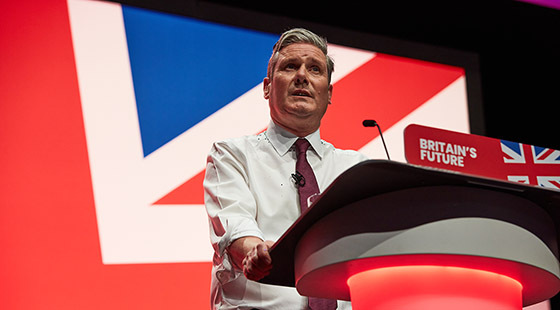Keir Starmer launches Skills England to end 'reliance' on overseas workers
Prime minister Keir Starmer said Britain’s skills system was “in a mess” and needed reform.
The government has launched its Skills England programme in a bid to reduce employers’ “reliance” on overseas workers for certain roles.
The new body will work with businesses, trade unions, mayors and training providers to identify skills gaps nationwide.
Prime minister Keir Starmer said Britain’s skills system was “in a mess” and the government wanted to transform “the relationship between business and the education system”.
Speaking at the launch of Skills England yesterday, Starmer said he did not want to criticise businesses that hire from overseas or the contribution of migration to the country.
However, he said it “cannot be right” that many people in the UK were not in work because “we can’t find a way of creating a coherent skills system”.
How will Skills England work?
Skills England will work more closely with the Migration Advisory Committee (MAC) to develop training plans for sectors that rely heavily on immigrants to fill roles.
The MAC faced criticism from the hospitality industry after it removed chefs from the shortage occupation list in 2020 because it said not enough was being done to train a UK workforce.
In its last review in October 2023, the MAC rejected calls for chefs and hospitality managers to join the list but said experienced sommeliers from overseas should be eligible for skilled worker visas.
Skills England will be established in phases over the next nine to 12 months to create a “responsive and collaborative” system.
It will see businesses given more flexibility on how they spend funds such as the apprenticeship levy on training.
The government is also working to simplify and devolve adult education budgets to Mayoral Combined Authorities, such as Greater Manchester under Andy Burnham, so they can address adult skills directly and support growth in their areas.
Richard Pennycook, former chief executive of the Co-operative Group, has been appointed interim chair of the organisation.
UKHospitality welcomed the launch of Skills England and said it could help hospitality drive growth.
Kate Nicholls, chief executive of UKHospitality, said: “The sector is already the third largest employer in the UK, providing 3.5m people with jobs, so it’s vital that our voice is represented within the new body.
“We are pleased to see the commitment of the new body to broaden the types of training that the Apprenticeship Levy can be spent, which will allow us to deliver a Hospitality Skills Passport, however we also need to see a focus on how apprenticeship delivery can be improved for the benefit of both workers and businesses and a focus on pre-apprenticeship training and we look forward to working closely together to achieve this.”
Read more: What does the King’s Speech mean for hospitality?

















